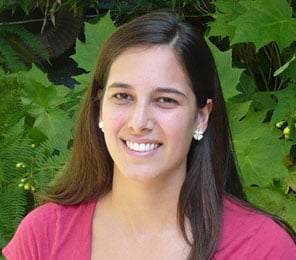Medicine from the heart . . . Pearl Houghteling
On Thursdays, the Daily Voice showcases selected Thursday Morning Memos, reflective essays about clinical experiences written by faculty, alumni, residents and students of the Department of Family Medicine & Community Health and, occasionally, contributors from other departments. Thursday Morning Memos is UMass Medical School’s homegrown version of narrative medicine, in which the authors process their experiences through writing. To learn more, visit: http://www.umassmed.edu/news/articles/2011/personal_stories.aspx.
|
Second-year School of Medicine student Pearl Houghteling writes about pride—in both her own evolution as a student and in her patient being able to care more for herself.—Hugh Silk, MD |
 |
Pride x 2
When I foam into a patient’s room, I’ll often hang back for a moment to let the antiseptic dry and to think about Jennifer, a patient whom I met in my preceptor’s office. She once complained that since getting sober, the smell of the foam made her crave alcohol. Other times, I remember Jennifer when I’m getting dressed. She had lamented that, in the homeless shelter, all of her socks and bras were stolen within a few days.
We first met after she had just gotten out of jail for harboring stolen goods for a friend. On the way into the exam room, my preceptor sighed, “I haven’t seen this patient in ages, I wonder what has happened,” and greeted the patient with a hug. At another visit soon after, I remember Jennifer planning to get an apartment with a sober friend. At our third appointment, we hardly had time to talk. She spent the visit on a nebulizer. On our most recent visit, I hardly expected to have much to discuss. My preceptor had informed me that she’d been managing her chronic back and hip pain well, and had a new boyfriend.
But this visit, Jennifer was sick. She’d been constipated, but then had diarrhea for two weeks, up to six times a day. She admitted to one instance of fecal incontinence, and the fear of it recurring had practically incarcerated her in her apartment. I reassured her that she had none of the red flags associated with more serious causes of diarrhea, and introduced her to the “BRAT” diet. My preceptor ordered a stool culture, including specific tests for C. difficile and an ova and parasite exam. Although I have not been able to follow up yet with my preceptor as to Jennifer’s progress, aside from Jennifer’s misery, this visit made me feel good.
Even though she was sick, Jennifer used positive coping skills when she tried an over-the-counter laxative for her constipation, and asked for help from her roommates and boyfriend. She had not gone to the emergency room or even come to our office for a day-of appointment. Instead, she came to her regular appointment on time. She had some emotional reserve. She took initiative in her own care by asking my preceptor to restart a prescription for iron supplements to combat her recent low energy.
In addition, I felt confident, and reassured by my conversation with Jennifer. I knew which questions to ask, and had the vocabulary to express myself. I did not shy away from asking about incontinence, not because I felt like I should ask the uncomfortable questions, but because it was relevant to her care. Jennifer’s trust encouraged rather than intimidated me. As I become more familiar with the science of medicine, those red flags and details of history-taking, I have the capacity to engage more in the human side of medicine.
I suppose my own progression from concentrating on the basics of physiology to appreciating the richness of the doctor-patient relationship has paralleled Jennifer’s transition over the past year. And for Jennifer, she was able to shift her focus from having clothes and a home to the relative luxury of managing an acute illness.